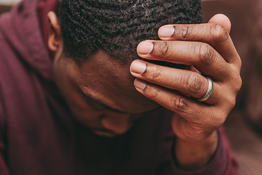Anxiety is a common emotion, and most of the time you're anxious for a specific reason. When you're fearful, your heart rate speeds up, your blood pressure rises, and your heart beats faster. But sometimes anxiety is an almost everyday occurrence. You may wake up apprehensive and fretful in the morning, or it might come on later in the day with no apparent reason why. If these episodes are persistent, this can be a sign of an anxiety disorder.
Anxiety disorders are classified into different types. So, it's not enough to say you have an anxiety disorder. The type you have can make a difference for treatment. Let's look at the five types of anxiety disorders that psychiatrists and psychologists recognize.
Panic Disorder
One of the most common types of anxiety disorder is called panic disorder. People who have this form of anxiety experience symptoms of anxiety that often come on suddenly and out of the blue. The symptoms can be physical in nature, like a rapid heart rate, palpitations, difficulty taking a deep breath, lightheadedness, dizziness, and sweating. Some people also experience psychological symptoms like feelings of unreality and fear that they'll collapse on the floor unless they get help. It's not uncommon for people with panic disorder to think they're having a heart attack. In fact, emergency rooms frequently see people with panic symptoms that resemble a heart attack.
Obsessive-Compulsive Disorder (OCD)
Obsessive-compulsive disorder (OCD) is another form of anxiety. The obsessive component of OCD refers to the tendency to have repeated unwanted thoughts that cause anxiety. For example, some people with obsessive-compulsive disorder become fixated on germs and being exposed to them, or may develop an obsession with not stepping on cracks on the sidewalk.
The compulsive component refers to the behaviors they do to keep their anxiety under control. For example, the person with an obsession with germs might wash their hands repeatedly and focus obsessively on staying clean. An individual obsessed with not stepping on cracks in the sidewalk will keep their attention focused on the ground so they can avoid them. People with this form of anxiety channel their fear and worries to specific objects or behaviors and behave compulsively to keep that anxiety in check.
Social Anxiety
Social anxiety is sometimes referred to as a social phobia. People with social anxiety experience extreme fear, worry, and anxiety when they're in a social situation. Before a social event, they may experience extreme worry and distress because they fear they'll do something stupid or people won't like them. Social anxiety can be focused, for example, a fear of parties in particular, or more generalized, fearing any type of social function.
Post-Traumatic Stress Disorder (PTSD)
Post-traumatic stress disorder (PTSD) is triggered by a traumatic event. The person with PTSD can't mentally overcome or let go of the trauma they experienced and may relive the events in their mind. At times, something in their environment can trigger a memory and they develop extreme anxiety. Examples of events that can cause post-traumatic stress disorder include weather disasters, being a victim of violence, fighting in a war, or being involved in an accident. For a psychiatrist to make this diagnosis, the symptoms need to be present for at least one month.
Generalized Anxiety Disorder
Generalized anxiety disorder is the most common form of chronic anxiety. If anxiety is long-standing and doesn't fit into one of the categories above, it's usually generalized anxiety disorder. People with this condition feel anxious much of the time and usually can't identify a specific trigger for their anxiety. They tend to worry chronically and without a specific trigger. Health care professionals usually diagnose generalized anxiety disorder if symptoms are present for at least six months. There is a genetic component to generalized anxiety disorder, as it's more common in certain families, and women are more prone to it than men. In fact, generalized anxiety is twice as common in females.
The Bottom Line
As you can see, chronic anxiety isn't a single disorder. It can be of various types, but only a psychiatrist is trained to make a diagnosis. Fortunately, there are therapies that can help, including cognitive and behavioral therapy by a licensed psychologist. However, there are strategies people can do at home like deep, controlled breathing exercises, meditation, self-hypnosis, mindfulness, and guided imagery.
References:
Medscape. "Posttraumatic Stress Disorder"
HHS.gov. "What are the five major types of anxiety disorders?"
National Institute of Mental Health. "Anxiety Disorders"

